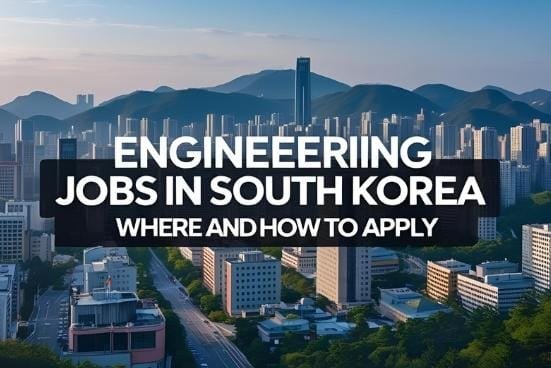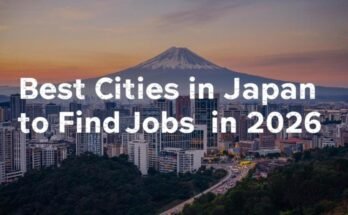Engineering Jobs in South Korea: Where and How to Apply
Exploring the South Korea job market reveals a world of engineering opportunities for the innovative and skilled. This country has become a hub for international engineering careers, welcoming talent from around the globe. It’s a place where high-tech industries thrive, inviting you to join their ranks. This article is your guide through the complex landscape of engineering jobs in South Korea. It aims to simplify the application process, providing you with the knowledge to start your engineering career here.

Key Takeaways
- Understanding the vast scope of engineering career opportunities in South Korea.
- Strategies to effectively apply for engineering positions in the South Korean market.
- Insights into the demand and support for international engineering careers in South Korea.
- Guidance on navigating the South Korea job market for aspirant foreign engineers.
- How to leverage your skills and background in securing an engineering role in South Korea.
Overview of the Engineering Job Market in South Korea
The South Korea engineering industry is undergoing a significant transformation. This change is fueled by advancements in technology, automotive, and green energy. These sectors are making the job market for engineers both vibrant and attractive. This growth benefits both local talent and expat engineers seeking new career opportunities.
Engineering jobs in South Korea offer more than just cutting-edge projects. They also come with competitive salaries. The region’s focus on technological and industrial growth makes it a prime destination for professionals looking to advance their careers.
Key Industries and Growth Areas
Technology is a standout sector in South Korea’s engineering industry. It includes semiconductor manufacturing and information technology. Automotive engineering is also crucial, driven by the demand for eco-friendly and smart vehicles. The green energy sector is booming, offering promising opportunities for engineers.

Demand for Foreign Engineers
The growing engineering sectors in South Korea are creating a high demand for skilled foreign engineers. Expat engineers bring valuable international experience and perspectives. This is crucial in today’s globalized market. Companies are actively seeking to attract top talent from around the world to stay competitive.
Salary Expectations and Benefits
Engineering salaries in South Korea are highly competitive in Asia. Engineers can expect attractive compensation packages. These include not just salaries but also benefits like housing allowances, health insurance, and annual bonuses. These incentives aim to attract and retain top engineering talent in a market that values innovation and expertise.
Types of Engineering Positions Available
South Korea’s engineering sector is rich with opportunities across various disciplines. Each field has adapted to the rapid technological advances and the changing demands of the global market. Below, we break down the major areas of engineering where job seekers are most likely to find opportunities: IT engineering careers, semiconductor industry roles, and biomedical engineering jobs.
Information Technology and Software Engineering
IT engineering careers in South Korea are thriving due to a robust digital infrastructure and the demand for continuous innovation. Roles range from software developers to systems analysts, each contributing to the IT backbone of major South Korean tech companies. These positions often require expertise in programming languages such as Python and Java, a strong understanding of software development methodologies, and the ability to solve complex problems efficiently.
Electronics and Semiconductor Engineering
The semiconductor industry in South Korea stands out on the global stage, driving significant economic growth. Engineering job types in this sector include process engineers, quality assurance specialists, and production managers, all essential to the design, fabrication, and testing of semiconductors. The demand for skilled professionals who can manage production cycles, improve yields, and innovate in silicon-based technology continues to rise.
Biomedical and Chemical Engineering
Biomedical engineering jobs are on the rise in South Korea, focusing on creating solutions that improve patient healthcare. Professionals in this field work on everything from pharmaceuticals to medical imaging devices. Similarly, chemical engineers contribute significantly to various industries including petrochemicals and environmental management. Their expertise helps develop efficient processes that minimize waste and enhance product quality.

For those considering a career shift or just starting out, the dynamic and evolving engineering sectors in South Korea offer promising paths filled with both challenges and rewards. Success in these roles not only contributes to personal career growth but also plays a part in the technological advancement and health sector improvements in the region and globally.
The Application Process for Engineering Jobs
Starting a job application in South Korea, especially in engineering, requires a deep understanding of several key areas. These include crafting a precise engineering resume, mastering interview strategies, and navigating work visa requirements. This section provides insights into these crucial areas, ensuring candidates are well-prepared to secure their desired position.
Resume and Cover Letter Tips
Engineering resume writing for the South Korean job market emphasizes clarity, conciseness, and relevance. Your resume should highlight technical skills and successful project outcomes. It should also contextualize your achievements within South Korean employer standards. Here are a few pointers:
- Focus on Efficiency: Engineering jobs in South Korea value precision and efficiency; structure your resume to reflect these qualities.
- Projects and Results: Detail your roles in projects with specific outcomes and technologies used, demonstrating applicable experience.
- Adaptability: Highlight experiences that showcase your adaptability to new technologies and methodologies, a valued trait in South Korean engineering spheres.
Your cover letter should be a direct communicative tool. It should underline how your specific background aligns with the job and company culture. It should clarify your potential contributions to prospective employers.
Understanding the Interview Process
Interview strategies in South Korea can differ significantly from those in other countries. In engineering jobs, technical expertise will often be tested. Questions will also assess your problem-solving abilities and adaptability to various work scenarios. Here’s how you can prepare:
- Technical Proficiency: Be prepared to discuss specific engineering problems or projects you’ve encountered and how you resolved them.
- Cultural Understanding: Familiarize yourself with basic South Korean business etiquette—respect and humility are pivotal during your interactions.
- Practical Demonstrations: You might be asked to demonstrate your problem-solving skills on the spot, so come ready to showcase your analytical and technical skills through practical tests or discussions.
Work Visa Requirements
Securing a work visa for South Korea is essential for foreign engineers. The process involves several detailed steps. These include securing a job offer from a South Korean company, which in turn needs to sponsor your visa. Essential documentation often includes:
- Employment Contract: An offer from a recognized South Korean engineering firm.
- Valid Passport: Ensure your passport is valid for at least six months beyond your intended stay.
- Educational and Professional Credentials: Notarized copies of your degrees and professional certifications. They may need to be validated by a Korean consulate.
Successfully navigating through these stages can greatly increase your chances of securing an engineering position in South Korea. With the right preparation, your job application will stand out. Your interview will go smoothly, and your work visa will be granted without hurdles.
Top Cities for Engineering Jobs in South Korea
South Korea’s urban centers are vibrant, serving as key hubs for technology and industrial innovation. These cities are perfect for engineers looking for diverse opportunities. We’ll explore Seoul, Incheon, and Busan, each with its own benefits for engineering professionals.
Seoul: The Tech Hub
Seoul stands as a global leader in the tech world, offering a wealth of engineering opportunities in Seoul. Its tech sector boasts advanced research facilities and innovation labs. These environments foster collaboration, drawing engineers from across the globe.
Incheon: Industrial Growth
Incheon is renowned for its Incheon industrial careers, thanks to its vast industrial zones and strategic logistics connections. Engineers here are at the forefront of manufacturing, automation, and green technology. They drive the advancement of sustainable industrial practices.
Busan: Shipbuilding and Marine Engineering
Busan’s coastal setting positions it as a critical center for Busan marine engineering. The city’s shipyards are where engineers design, build, and repair maritime vessels. This includes everything from commercial cargo ships to advanced navy frigates.
| City | Industry Focus | Opportunities |
|---|---|---|
| Seoul | Technology, Electronics | Software and IT Engineering |
| Incheon | Industrial Manufacturing | Automation, Environmental Tech |
| Busan | Maritime Engineering | Shipbuilding, Marine Design |
Engineering Jobs in South Korea: Where and How to Apply
When exploring finding engineering jobs in South Korea, adopting effective application strategies is key. This is due to the unique landscape of South Korea employment opportunities. This section will guide you on how to streamline your job search and boost your chances in this competitive market.
Understanding the industry and matching your skills with market demand is crucial. Fields like IT, biotechnology, and electronics are booming with opportunities. Identifying sectors in high demand can give you an edge in your job search.
- Research the top engineering firms and sectors actively seeking specialists.
- Gain insights into the preferred qualifications and experiences desired in the South Korean market.
- Regularly update your resume and tailor your cover letter for each application to highlight your relevant skills and experiences.
Networking is a powerful tool in finding engineering jobs. Engaging with professional groups and online platforms dedicated to the engineering community in South Korea can provide valuable contacts. It also offers insider information on job openings and application strategies. Here are practical steps to incorporate networking into your job search:
- Join professional engineering associations based in South Korea.
- Participate in relevant webinars and local conferences to meet industry professionals.
- Use LinkedIn to connect with HR managers and recruiters in the engineering field.
Lastly, understanding the timing of hiring cycles in South Korea can elevate your job search strategy. Many companies hire at specific times of the year, usually aligned with their fiscal calendars. Timing your applications to these cycles can improve your visibility and increase the likelihood of success.
By carefully planning your approach and utilizing these strategies, you can enhance your prospects in the engineering job market in South Korea. Remember, it’s not just about finding engineering jobs; it’s about finding the right job where your skills and ambitions align with the opportunities available.
Qualifications and Skills Required
To thrive in engineering in South Korea, candidates need a mix of engineering qualifications, soft skills for engineers, and Korean language skills. These are not just good to have; they are crucial for success and fitting into the local culture. This part explains the key educational, linguistic, and interpersonal skills engineers should focus on and develop.
Educational Background
Engineering qualifications are the foundation for career success in South Korea. Given the technical nature of the field, a strong education in areas like electrical, mechanical, or software engineering is essential. Most South Korean companies demand at least a bachelor’s degree in engineering, with many seeking higher qualifications for research and development roles.
Language Proficiency
While not all engineering jobs in South Korea need Korean fluency, having Korean language skills can greatly improve one’s career prospects. Proficiency in Korean facilitates better communication with colleagues, understanding project documents, and integrating into the corporate world. It also demonstrates respect for Korean culture, making candidates more attractive to local employers.
Soft Skills and Adaptability
Beyond technical abilities, engineers must possess important soft skills. These include teamwork, problem-solving, adaptability, and communication. The ability to adjust to South Korea’s work culture, emphasizing hierarchy and consensus, is particularly valued. Engineers must be adept at navigating these dynamics to build effective teams and achieve success.
In conclusion, combining these qualifications and skills not only makes it easier to enter the South Korean engineering job market. It also supports long-term career development and job satisfaction in this dynamic and technologically advanced country.
Networking and Professional Communities
In today’s interconnected world, professional networking in South Korea is key to advancing an engineering career. The engineering field, with its global reach, heavily relies on engineering communities and industry events. By tapping into both online networks and direct community interactions, professionals can gain a competitive edge in South Korea’s fast-paced engineering landscape.
Online Platforms and Social Media
The role of social media networking in professional development is immense. South Korea’s vibrant online scene offers a space for professionals to connect, exchange ideas, and find job openings. Platforms like LinkedIn and Naver’s Café are crucial for forging connections and keeping up with engineering’s latest trends and opportunities.
Professional Associations and Events
Membership in professional associations is a powerful strategy for professional networking in South Korea. These groups organize industry events, providing a chance to interact with industry leaders and colleagues. Workshops, seminars, and conferences, especially those focused on engineering communities, are invaluable. They offer insights from seasoned professionals and can shape one’s career path.
- Attending local and national conferences
- Participating in workshops and technical presentations
- Networking sessions which often include job fairs
Cultural Considerations in the Workplace
Understanding South Korean workplace culture is essential for professionals aiming to thrive in Korea. The work environment is shaped by traditional values, influencing modern business etiquette in Korea. Grasping these cultural subtleties aids in integrating into a new professional environment and boosts cross-cultural communication.
In Korea, work ethics and organizational hierarchy are paramount in daily business. A shared understanding of these aspects fosters successful professional ties and a respectful workplace.
Understanding Korean Work Ethics and Practices
Korean professional settings value hard work and education highly. Employees are expected to show unwavering dedication, often working extended hours and engaging in team-building activities. This commitment reflects South Korea’s pursuit of excellence and innovation, especially in tech and engineering.
Adapting to the Korean Corporate Culture
Adapting to Korean corporate culture requires observing the hierarchy’s importance. Decisions flow from the top, and politeness and respect for seniors are paramount. For foreign professionals, cross-cultural communication is key, as understanding verbal and non-verbal cues is crucial. Familiarity with indirect communication styles helps avoid conflicts and promotes smoother interactions.
| Aspect | Description | Importance in Korean Culture |
|---|---|---|
| Work Hours | Often extends beyond the typical 9-to-5 | High |
| Respect for Hierarchy | Respectful interactions with superiors | Critical |
| Indirect Communication | Used to maintain harmony and avoid direct conflict | Essential |
Embracing the nuances of South Korean workplace culture and business etiquette in Korea is vital. It not only aids in a smoother transition but also enhances professional relationships and career success in this culturally vibrant nation.
Success Stories: Foreign Engineers in South Korea
In South Korea’s vibrant industries, expat engineers have made significant strides in their careers. This section explores the remarkable career journeys of these engineers. It highlights the crucial moments of overcoming work challenges abroad, showcasing the path many have taken for professional growth.
The career paths of expat engineers in Korea vary, yet common themes emerge. Persistence, cultural adaptability, and a commitment to learning are key. Engineers have thrived in sectors like advanced technology in Seoul and industrial projects in Busan. Their success underscores the value of local networking and grasping cultural nuances to build strong professional relationships and achieve project goals.
| Engineer Background | Industry | Key Challenges | Outcome |
|---|---|---|---|
| Software Engineer from India | Information Technology | Language barrier, adapting to agile work culture | Lead Developer, innovated a multi-language software interface |
| Mechanical Engineer from Germany | Automotive | Cross-cultural team dynamics | Spearheaded a project for eco-friendly vehicles |
| Systems Engineer from Canada | Telecommunications | High-stress project deadlines | Designed a patented communication protocol |
Adapting and solving workplace challenges creatively not only boosts personal growth but also drives technological and engineering progress in South Korea. The success stories of expat engineers in Korea serve as a beacon for international professionals. They show that overcoming work challenges abroad is not just about career success but also about personal and professional evolution.
Legal and Administrative Procedures
Moving to South Korea as an engineer requires understanding several legal and administrative steps. You must navigate visa procedures, secure health insurance, and comply with expatriate taxation. These steps are crucial for a smooth transition and legal adherence. This section will guide you through these essential processes.
Visa application and renewal processes can be complex. Engineers typically need E-series visas, designed for skilled professionals. Having a valid passport, employment contract, and professional certifications can speed up your application.
Health insurance in South Korea is also crucial. The country has a National Health Insurance program for expatriates. Knowing how to enroll and what benefits are covered is important for your financial planning and peace of mind.
Expatriate taxation is another significant factor. Foreign engineers need to understand tax treaties between their home country and South Korea. This knowledge can help you avoid unnecessary taxes. Consulting a tax professional who specializes in international taxation is advisable.
Successfully navigating these legal frameworks ensures compliance and enhances your experience in South Korea. Preparation and awareness of these responsibilities are key to maximizing your engineering career in South Korea.
Resources and Tools for Job Seekers
In today’s competitive job market, having the right job search resources is crucial. For engineers in South Korea, this means leveraging specialized job board listings and connecting with recruitment agencies for engineers. The right tools simplify and tailor the search process for the engineering sector, increasing your chances of finding a suitable position.
Effective job-hunting strategies involve a combination of resources. Whether you’re looking in electronics, software, or mechanical engineering, knowing about tailored platforms can significantly improve your search. This awareness is key to finding the right opportunities.
- Specialized Job Boards: Job boards focused on engineering roles offer targeted job listings designed for engineers. These platforms list opportunities in specific areas, such as renewable energy and robotics.
- Recruitment Agencies: Recruitment agencies focused on engineering help find positions that match your skills and career goals. They assist in tailoring your application to meet employer requirements.
To effectively use these job search resources, keep your skills up-to-date and your application materials polished. Stay informed about industry developments and network within the field. This will increase your visibility among potential employers.
Conclusion
Starting a career in engineering opens doors to innovation, growth, and global opportunities, especially in South Korea. This article has explored the dynamic engineering job market in South Korea. We’ve highlighted key industries and various engineering roles, along with tips on the application process and visa requirements.
The tech scene in Seoul and industrial innovation in Incheon offer rich opportunities for engineers. With the right qualifications and cultural understanding, you can excel in the Korean corporate environment. The strategies and resources shared aim to guide you in finding engineering jobs and understanding the legal aspects of working abroad.
With knowledge on job boards, networking, and the administrative side of working abroad, you’re ready for an exciting career in South Korea. Use the insights provided to improve your job search and application. Your engineering career in South Korea is waiting, with a vibrant landscape to pursue your professional goals.



